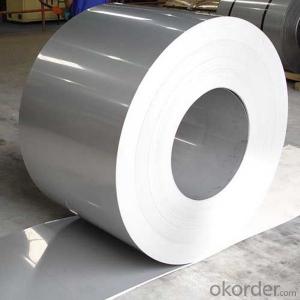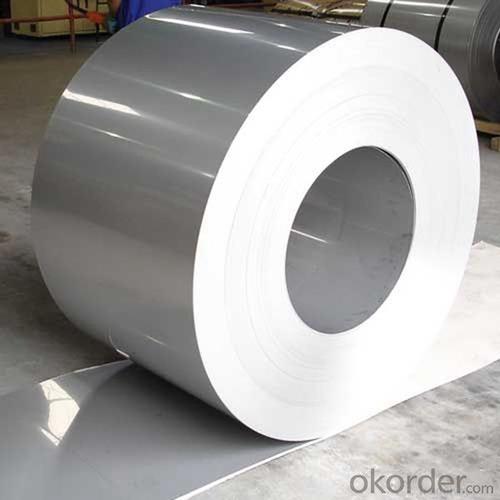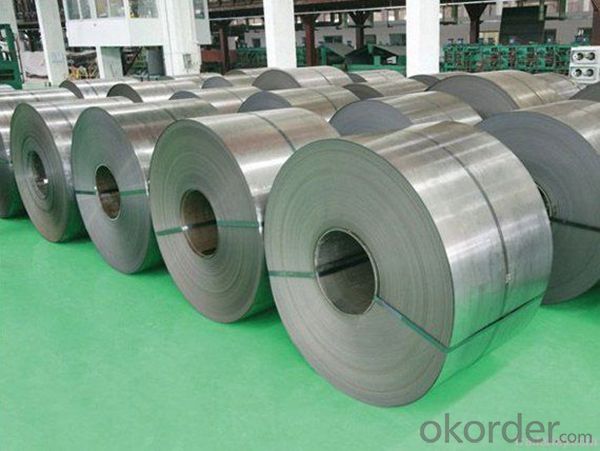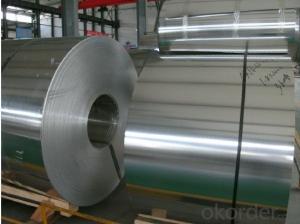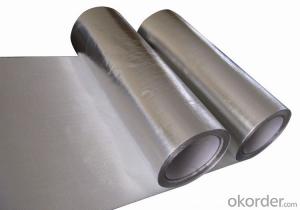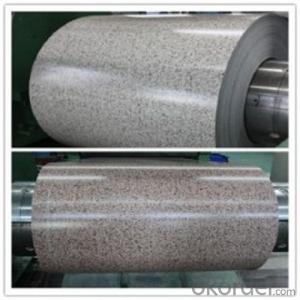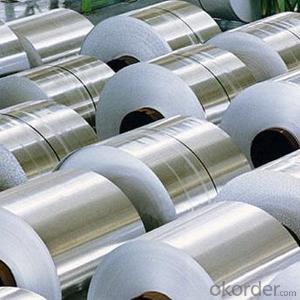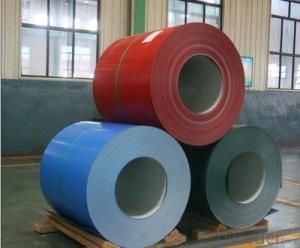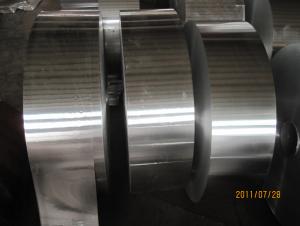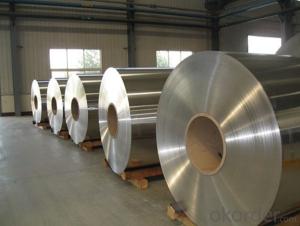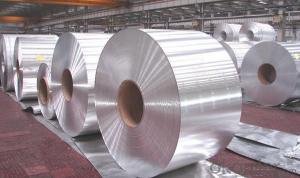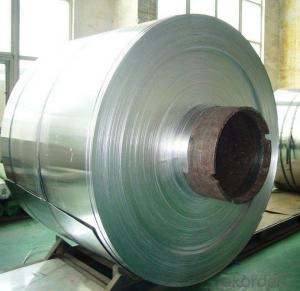Rona Aluminum Coil - Continuous Cast Aluminum Coil AA1200 H14 for Building
- Loading Port:
- Shanghai
- Payment Terms:
- TT OR LC
- Min Order Qty:
- 5 m.t.
- Supply Capability:
- 10000 m.t./month
OKorder Service Pledge
OKorder Financial Service
You Might Also Like
Specification
1. Specification of Continuous Cast Aluminium Coil AA1200 H14 for Building
Name | Aluminum Coil |
Brand | CNBM |
Alloy | 1100H-18, 3003-H24,3003-H26,3005-H26,8011,3004,3105,5005,etc. |
Thickness | 0.1~1.5mm |
Width | <2000mm< span=""> |
MOQ | 1 MT |
Coating finish | Brushed, drawing, embossed, printing |
Color | As to code RAL |
Surface | Embossed,Mill Finish,Coated,Brushed |
Gloss | 10-90%(EN ISO-2813:1994) |
Total coating thick | PVDF27 ~35micron |
Polyester18~27micron(EN ISO-2360:1995) | |
Coating hardness | 2H |
Adhesion | 5B (EN ISO-2409:1994) |
Impact resistance | No cracking and peeling (A.S.T.M D2794-1993) |
Flexibility (T-bend) | 0T- 2T |
MEK resistance | 100 |
Certification | ISO9001:2000, CE, SGS |
Coil's standard diameter | 1100mm |
Inner Diameter | 405mm/505mm |
Coil's standard weight | 1MT - 2MT |
2. Application of Continuous Cast Aluminium Coil AA1200 H14 for Building
(1).Interior: wall cladding, ceilings, bathrooms, kitchens and balconies, shutters, doors...
(2).Exterior: wall cladding, facades, roofing, canopies, tunnels,column covers , renovations...
(3).Advertisement: display platforms, signboards, fascia, shop fronts...
3. Feature of Continuous Cast Aluminium Coil AA1200 H14 for Building
*Such coil is specially designed to replace aluminum ingot, due to the high export tax of aluminum ingot, the coil has better price than ingot.
*This type of coil can fit customer's remelting furnace just like ingot, no need to make any change to the production line that was previously used for ingot. The standard coil size and weight is very suitable for the feed gate of furnace.
*This type of coil causes less material wastage than ingot when remelted.
*Our coil is made directly from ore, no need to go though the ingot making process, quality is much better than other suppliers who use ingot scrap to make coil.
Be free from Oil Stain, Dent, Inclusion, Scratches, Stain, Oxide Dicoloration, Breaks, Corrosion, Roll Marks, Dirt Streaks and other defect which will interfere with use
4. Certificate:
SGS and ROHS(if client request, paid by client), MTC(plant provided), Certificate of Origin(FORM A, FORM E, CO), Bureau Veritas and SGS (if client request, paid by client), CIQS certificate
5. Image of Continuous Cast Aluminium Coil AA1200 H14 for Building
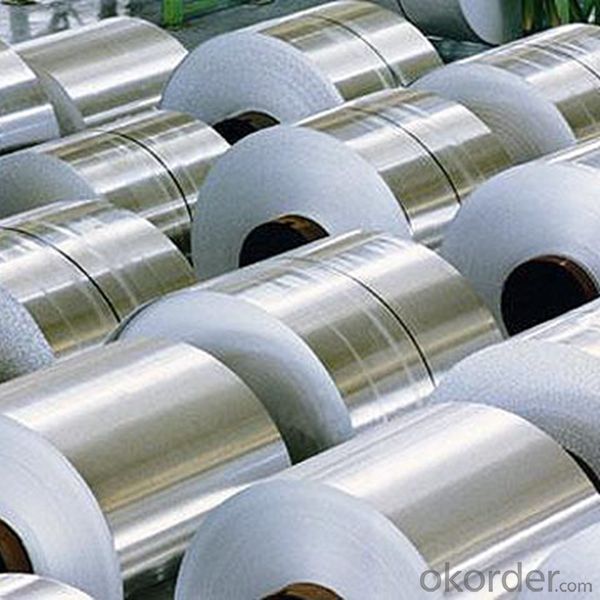
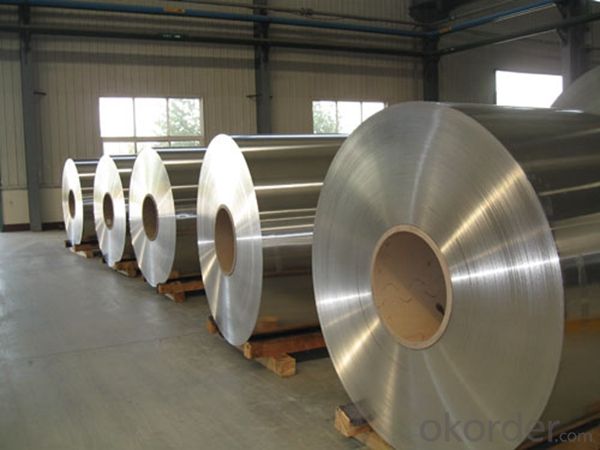
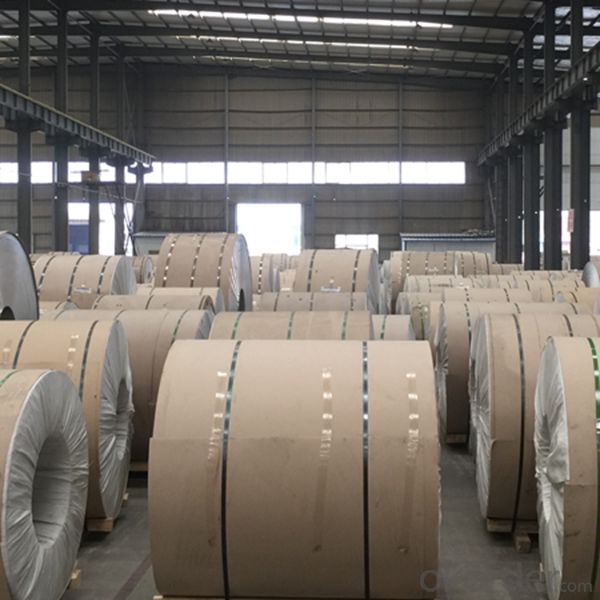
6. Package and shipping of Continuous Cast Aluminium Coil AA1200 H14 for Building
eye to wall
eye to the wall
with wood pallet (wooded case also available)
7. FAQ
1) What is the delivery time?
Dpends on actual order, around 20 to 35 days
2)What is the QC system:
We have QC staff of 20 persons and advanced equipment, each production is with MTC traced from Aluminum ingot lot.
3) What market do you mainly sell to?
Australia, America, Asia, Middle East, Western Europe, Africa etc
- Q: What certifications might be necessary for the production, sale, or use of aluminum coils?
- <p>Aluminum coils may require various certifications depending on their intended use and the standards set by different countries or industries. Common certifications include ISO 9001 for quality management systems, ISO 14001 for environmental management, and specific industry standards such as ASTM or EN standards for material properties and safety. For construction or automotive applications, additional certifications like CE marking in Europe or DOT certification in the US may be necessary. It's crucial to consult with industry standards and regulatory bodies to determine the exact certifications required for a specific application.</p>
- Q: How are aluminum coils used in the production of electronic devices?
- The production of electronic devices heavily relies on aluminum coils, which perform a crucial role. When it comes to manufacturing the internal components of electronic devices like transformers, inductors, and electromagnets, aluminum coils are the go-to material. These coils are formed by winding aluminum wire around a core, creating a compact and efficient conductor for electrical currents. Transformers make use of aluminum coils to transfer electrical energy between circuits. By utilizing electromagnetic induction, these coils allow for voltage transformation. When a varying current flows through one coil, it induces a voltage in another coil. This process is essential in adjusting voltage levels, ensuring efficient power distribution in electronic devices and electrical systems. Inductors, another vital component in electronic devices, are constructed using aluminum coils. These coils resist changes in electrical current and store energy in their magnetic field. Aluminum coils possess low resistance, high conductivity, and the ability to handle high-frequency currents, making them perfect for inductor applications. They find their use in various electronic devices like power supplies, speakers, and filters to control current flow and regulate voltage. Furthermore, aluminum coils are utilized in the production of electromagnets, which are widely employed in electronic devices. The creation of electromagnets involves passing an electric current through a coil to generate a magnetic field. Aluminum coils are preferred due to their lightweight nature and excellent thermal conductivity, enabling efficient dissipation of heat in high-power applications. Moreover, the use of aluminum coils in electronic devices brings several advantages such as cost-effectiveness, lightweight construction, and excellent electromagnetic properties. Aluminum's lightweight characteristic allows for the production of compact and portable electronic devices, enhancing convenience for users. Additionally, its high thermal conductivity ensures efficient heat dissipation, which is critical in preventing overheating and maintaining proper functionality of electronic devices. In conclusion, aluminum coils find extensive usage in the production of electronic devices, serving various applications like transformers, inductors, and electromagnets. Their exceptional electrical conductivity, lightweight construction, and thermal conductivity make them an ideal choice for achieving efficient and reliable performance in electronic devices.
- Q: Are there any specific regulations for the transportation of aluminum coils?
- Yes, there are specific regulations for the transportation of aluminum coils. These regulations aim to ensure the safe handling and transport of aluminum coils to prevent any accidents or damage. Some of the key regulations include: 1. Packaging requirements: Aluminum coils should be properly secured and packaged in suitable containers to prevent shifting, damage, or falling during transportation. This may include the use of strapping, banding, or shrink-wrapping. 2. Weight restrictions: There are weight restrictions on the transport of aluminum coils, which vary depending on the type of transportation mode being used. These restrictions are in place to ensure the stability and safety of the vehicle during transit. 3. Loading and unloading procedures: Proper loading and unloading procedures should be followed to minimize the risk of damage to the coils and to ensure the safety of workers. This may involve the use of specialized equipment such as cranes or forklifts. 4. Hazardous materials regulations: In some cases, aluminum coils may be considered hazardous materials due to their flammability or other characteristics. If this is the case, additional regulations and requirements may apply, such as proper labeling, documentation, and handling procedures. 5. Transportation permits: Depending on the size, weight, and destination of the aluminum coils, specific permits or licenses may be required for their transportation. These permits ensure compliance with local, state, and federal regulations. It is important for companies involved in the transportation of aluminum coils to be aware of and comply with these regulations to ensure the safe and efficient transport of the coils. Failure to adhere to these regulations can result in fines, penalties, or even legal consequences.
- Q: How are aluminum coils priced?
- Aluminum coils are typically priced based on various factors such as the current market price of aluminum, the size and thickness of the coil, the quantity ordered, and any additional customization or processing requirements. Additionally, factors like transportation costs and market demand can also influence the pricing of aluminum coils.
- Q: What are the recognized standards that dictate the quality of aluminum coil?
- <p>Yes, there are several standards that define the quality of aluminum coil. These include ASTM B209, which specifies requirements for aluminum and aluminum alloy flat sheet, coil, and plate for general usage. ASTM B210 covers aluminum and aluminum alloy sheet and plate for heat-treating. Additionally, EN 485 is a European standard that specifies the requirements for aluminum and aluminum alloy cold-rolled sheets, strips, and plates. These standards outline dimensions, chemical composition, mechanical properties, and other quality aspects to ensure the material meets industry requirements.</p>
- Q: We are shopping for a new LQ trailer. We are looking at several different brands and noticed that some have aluminum skin on an aluminum frame, and others have aluminum skin on a steel frame. Other than the obvious differences in weight and cost, what are other benefits/disadvantages of each? Thanks
- Aluminum Trailer Frames
- Q: Can aluminum coils be used in food processing industries?
- Yes, aluminum coils can be used in food processing industries. Aluminum is non-toxic, lightweight, and has excellent conductivity, making it suitable for various applications in the food industry. It is commonly used in food packaging, cooking utensils, and equipment, including heat exchangers and refrigeration units. Additionally, aluminum coils are corrosion-resistant and easy to clean, making them a safe and hygienic choice for food processing.
- Q: When aluminum metal is heated with an element from group VIA of the periodic table, an ionic compound forms. When the experiment is performed with an unknown croup VIA element, the product is 18.56% Al by mass. What is the formula of the compound and what is its name?
- Let's say you have l00 grams of this compound, so inside the compound would be l8.56 grams of Aluminum and the remaining. 81.44 grams of the second element. Elements in group 6A have 6 electrons in their outer shell and an oxidation # of -2 and the formula for the compound would be Al2X3. a 2mole Al to 3 mole X ratio. The compound would have the atom ratio of Al2X3 derived from the valences of +3 and -2. So the two aluminum atoms in the compound would be providing a total mass of l8.56 grams and the three atoms of X would be providing the remaining mass of 81.44 g so we have the ratio. l8.56 g Al/ 2 Al moles = 81.44 grams element X/ 3 moles X The mass ratio between these two elements is 8l.44 over l8.56 or 4.38 to l The atomic wt. total for 2 aluminum atoms is 54 so the atomic wtl total for three atoms of element X should be 4.38 times 54 which is 236.9 Now if we divide 236.9 by three atoms of X in the compound we get an atomic wt. of 78.9 which corresponds to Selenium So the compound is Al2Se3. This was a challenging problem, congratulations to your chem teacher.!!!
- Q: This question asks for the current market price of aluminum coils.
- <p>The price of aluminum coils can vary significantly based on factors such as grade, thickness, width, and market conditions. As of my last update, prices fluctuate daily due to global supply and demand, economic indicators, and geopolitical events. For the most accurate and up-to-date pricing, it's best to consult with metal suppliers or check commodity exchanges like the London Metal Exchange (LME). Prices are typically quoted in dollars per metric ton and can range from a few thousand to several thousand dollars depending on the aforementioned factors.</p>
- Q: Can aluminum coils be recycled multiple times?
- Yes, aluminum coils can be recycled multiple times. Aluminum is a highly recyclable material, and the recycling process for aluminum coils involves melting them down to create new coils. This means that aluminum coils can be recycled indefinitely without losing their properties or quality.
Send your message to us
Rona Aluminum Coil - Continuous Cast Aluminum Coil AA1200 H14 for Building
- Loading Port:
- Shanghai
- Payment Terms:
- TT OR LC
- Min Order Qty:
- 5 m.t.
- Supply Capability:
- 10000 m.t./month
OKorder Service Pledge
OKorder Financial Service
Similar products
Hot products
Hot Searches
Related keywords
